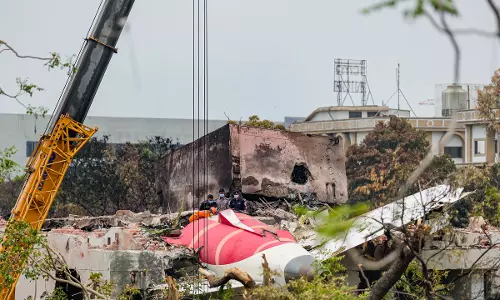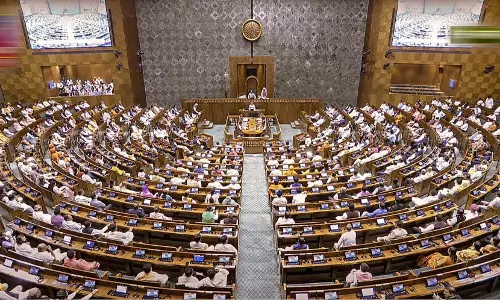Modi-Abe: Business of friendship
The considerable progress in India-Japan ties over the last few years has fructified in major deals being struck in the latest round of meetings between the Prime Ministers.;
The considerable progress in India-Japan ties over the last few years has fructified in major deals being struck in the latest round of meetings between the Prime Ministers. The chemistry between the two leaders, Narendra Modi and Shinzo Abe, has been majorly responsible for the signing of landmark agreements.
The Japanese Prime Minister’s visit to India, as part of the agreement that the two Prime Ministers meet every year, has been exceptional in taking the template of relationship well forward. The Modi-Abe comfort level and the overall ambience of trust is reflected in Japan and India also signing an MoU on the civil nuclear deal, justifying Mr Modi’s description of it as more than just an agreement for commerce and clean energy. “It is a shining symbol of a new level of mutual confidence,” Mr Modi commented and he had a good reason to given the fact that till recently India was a nuclear outcast of the world. There are still details to be worked out regarding the fate of reprocessed material, etc. with Japan having to tone down its moral objections to the spread of nuclear technology before the MoU becomes a full-fledged deal.
Japan’s terms for India’s development drive are also extremely generous. It has always lent to India its enormous technological capability and it goes further now in terms of being chosen to put up the first Shinkansen “bullet train” pathway in India between Ahmedabad and Mumbai, an initiative that is of far more recent vintage than agreements signed in other areas, including over advanced equipment for the Indian armed forces, most of all the Navy. The deals are as much a success of business negotiation skills as a tacit admission of the elephant in the room when it comes to diplomatic exchanges since China is always on the mind when India and Japan meet.
No formal agreement would ever acknowledge that the geopolitics of the region is being driven by the fear that China’s rise in the region is likely to lead to swings between peaceful progress in terms of trade and tumultuous military postures. The ties between China and Japan, highlighted by trade in the region of $300 billion, have been somewhat colder in most recent times thanks to the issues over the free right of passage in sea lanes in the South China Sea and claims to tiny islands in the East China Sea. While Germany, Japan and India have always treated China with great care as trade allies, they have also constantly sought permanent places for themselves on the United Nations Security Council by acting in tandem and hoping to counter China’s growing influence as a world power. The India-Japan bonhomie has to be seen in the perspective of the balance of powers in the region. It must help a great deal that the two Prime Ministers are on the same wavelength in these matters.





